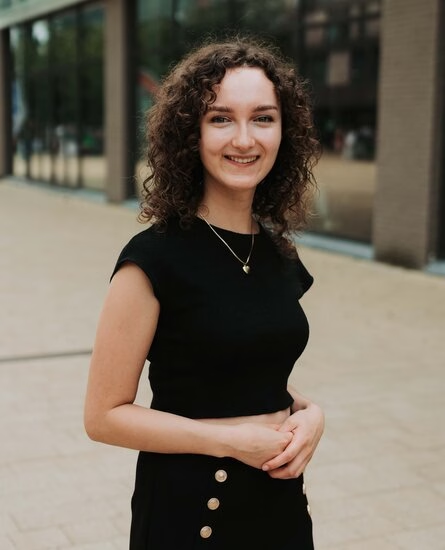The University Council consists of 12 student members and 12 staff members, all of whom are chosen by the university's community.
The University Council represents the Erasmian community at the most central level. By asking questions, giving advice and being a critical friend, the University Council aims to achieve the vision of "Creating Positive Societal Impact, the Erasmian way".
Student members
The elected student members of 2025-2026 are: Adina Popovici, Bilal El Allouchi, Bodi Winkler, Borja Ranzinger, Deniz Alican, Dogukan Demirbuken, Joseph Ayinla, Lourdes Wansink Manglano, Manuela Bartolovic, Mohamed Khalil, Rik Alleleijn and Simon Maas.
Staff members
The elected staff members of 2025-2027: Albert Wagemans (ESE), John Hays (Erasmus MC), Caressa Bol (ESHPM), Federica Violi (ESL), Hans van Oosterhout (RSM), Linda Dekker (ESSB/EUC), Clara Egger (ESSB/EUC), Max Wagenaar (ESPhil), Iwona Gusc (ESHCC), Jaap Cornelese (PRO), Sebastiaan Kamp (PRO) and Rosita Boedhai (ISS).
President of the University Council is Luca Hellings
The clerk is Roxanne Austin
The 12 student and 12 staff members are divided over (semi)permanent taskforces to enhance discussion, create progress, and take action. Below you find an overview of the permanent taskforces.
The Brede Rotterdamse Studentenraad (BRS) is a council consisting of student representatives form all higher education institutions in Rotterdam. The BRS serves as a platform to discuss and coordinate topics that affect the student community citywide, fostering collaboration across institutions. The BRS members represent their respective institutions and jointly work on advising local stakeholders, including the municipality, on issues relevant to students.
The confidentiality committee is an ad hoc committee that only meets when there is a specific reason for this. The committee consists of two staff members, two student members, the chairman of the university council and the clerk.
The confidentiality committee has the task to advise the University Council on:
- The appointment of the Chairman of the Board;
- The appointment of a member of the Board if the University Council is heard;
- Other matters concerning the appointment of persons;
- Other matters of a personal nature.
The meetings of the confidentiality committee are not public. Unless this is deemed necessary, no minutes are made of the meeting of the confidentiality committee.
At EUR there is a disaster organisation in place which comes into action in case an incident happens within the EUR that cannot be remedied within the organisation.
The Crisis Management Team (CMT) comes into action if the primary business process (Education and Research) is seriously disrupted, and the continuity of the entire organisation is under threat.
The 'daily board' of the University Council consists of the Presidium, consisting of the Chair of the council and four members (two members from the staff section and two from the student section). The presidium meets each week on Monday. The Presidium is tasked with initiating proposals to the UC regarding the planning, agenda of plenary meetings, advising the council how to approach a topic and any other business.
The powers of the University Council are specified in the Higher Education and Research Act. The basic principle is that the Executive Board, generally in consultation with the faculties manages the university. Due to the specified powers, the University Council can exert influence on decisions made by the Executive Board. On many topics the University Council has the right of consent or the right to advise. Additionally, with regard to all topics the Council has the right to be informed, right of initiative, and the right to be heard.
For many topics the Executive Board must submit proposals to the University Council to obtain their advice on specific decisions. The Council can then make its position clear by advising the Board. This can mean that the Council advises changes to be made to the proposed plans (or parts of the plan).
The Executive Board can only issue a definitive decision when the University Council has issued its advice on this decision. It is therefore important for the Council to convince the Executive Board using persuasive arguments that modification of the plans shall lead to better outcomes for the university.
The University Council has the right to all information that is required to carry out its work. The Council can therefore request information on practically any topic from the Executive Board or other parties at the university.
The University Council can make proposals to the Executive Board whenever it pleases as long as the proposals are well-founded and appropriate within the context of the central policy of the EUR. In this way the Council itself can also improve concrete issues at the university.
The University Council has the right to be heard before decisions are taken. Only after the Council feels that its opinion has been taken into consideration can such a decision be taken definitively.
Every term the UC has eight cycles in which we work on various topics brought to us by the organisation or picked up by ourselves to work on. Every cycle consists of six weeks, where the entire council meets for four meetings. The third meeting is a consultation meeting where the Executive Board joins the table.
Prior to making decisions or offering recommendations in plenary meetings, the various topics are discussed thoroughly in taskforces. During these meetings the taskforces invites representatives and EUR officials to present on behalf of the Executive Board to answer questions, resolve concerns, and explain proposals.
On top of the permanent taskforces, the Council also has semi-permanent and cycle taskforces to focus on more specific topics. This enables the Council to be agile, flexible, and efficient where needed. The semi-permanent taskforces focus on topics such as sustainability on campus, election system for students, the smoking ban, diversity and inclusion, EUR finances and more.
All of the University Council meetings and meeting documents, and the consultation meetings are open to the public. You can find the calendars and minutes of the meetings on this website.

 Roxanne Austin
Roxanne AustinClerk of the University Council
Administrative AffairsEmail address
Student Assistants University Council
 Kayla Desnaya Putri Dharma
Kayla Desnaya Putri DharmaMarketing Officer
Email address Anne Vromant
Anne VromantCommunications & Event officer
Email address Floortje Dekker
Floortje DekkerAdministrative assistant
Email address
Management Assistant University Council
Eline van Munster
- Email address
- university.council@eur.nl
- Room
- A2-07
- Address
- Burgemeester Oudlaan 50
3062 PA
Rotterdam
Rules and Regulations University Council
- Regulations governing payments for University Council work 2020 pdf, 503.31 KB
- Rules of procedure of the Erasmus University Council 2023 pdf, 5.4 MB
- EUR campaign budget rules for student elections of the UC EUR 2024 ENG_NL pdf, 97.74 KB
- Election rules for the University Council 2023 pdf, 179.95 KB
- Regulations for the University Council 2017 pdf, 679.5 KB
